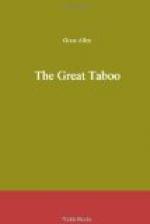Muriel’s curiosity, however, centred most about the mysterious old parrot, of whose strange legend so much had been said to her. After they had sat for a little under the shade of the spreading banyan, to cool down from their walk—for it was an oppressive morning—M. Peyron led her round to his aviary at the back of the hut, and introduced her, by their native names, to all his subjects. “I am responsible for their lives,” he said, gravely, “for their welfare, for their happiness. If I were to let one of them grow old without a successor in the field to follow him up and receive his soul—as in the case of my friend Methuselah here, who was so neglected by my predecessors—the whole species would die out for want of a spirit, and my own life would atone for that of my people. There you have the central principle of the theology of Boupari. Every race, every element, every power of nature, is summed up for them in some particular person or thing; and on the life of that person or thing depends, as they believe, the entire health of the species, the sequence of events, the whole order and succession of natural phenomena.”
Felix approached the mysterious and venerable bird with somewhat incautious fingers. “It looks very old,” he said, trying to stroke its head and neck with a friendly gesture. “You do well, indeed, in calling it Methuselah.”
As he spoke, the bird, alarmed at the vague consciousness of a hand and voice which it did not recognize and mindful of Tu-Kila-Kila’s recent attack, made a vicious peck at the fingers outstretched to caress it. “Take care!” the Frenchman cried, in a warning voice. “The patriarch’s temper is no longer what it was sixty or seventy years ago. He grows old and peevish. His humor is soured. He will sing no longer the lively little scraps of Offenbach I have taught him. He does nothing but sit still and mumble now in his own forgotten language. And he’s dreadfully cross—so crabbed—mon Dieu, what a character! Why, the other day, as I told you, he bit Tu-Kila-Kila himself, the high god of the island, with a good hard peck, when that savage tried to touch him; you’d have laughed to see his godship sent off bleeding to his hut with a wounded finger! I will confess I was by no means sorry at the sight myself. I do not love that god, nor he me; and I was glad when Methuselah, on whom he is afraid to revenge himself openly, gave him a nice smart bite for trying to interfere with him.”




